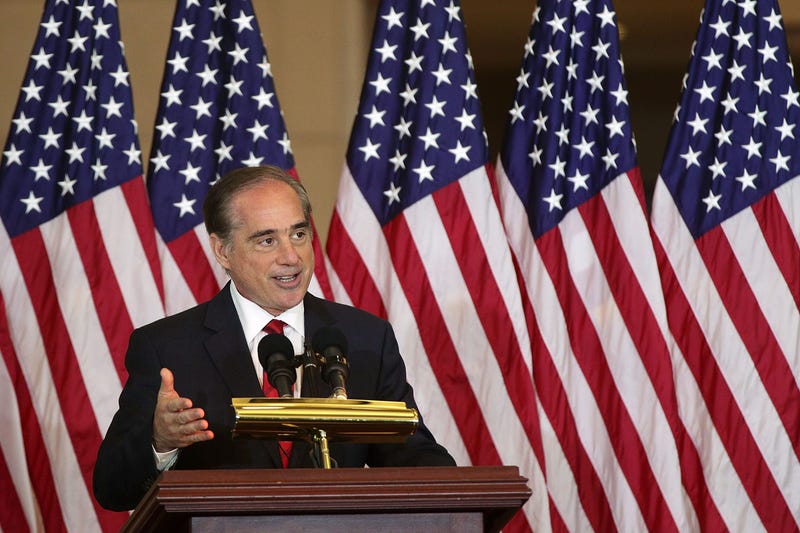
If the United States’ healthcare systems are ever overwhelmed in a national emergency such as a pandemic, the Department of Veterans Affairs is the last line of defense.
VA has more than 1,000 hospitals, clinics and other medical facilities across the country serving 9 million veterans. That makes it America’s largest single healthcare provider and means it has a greater scope and authority than any other agency to provide assistance in crises.
Former VA Secretary Dr. David Shulkin has confidence in VA staff to work to protect U.S. veterans, but said his former agency will no doubt face challenges entering what rapidly became “uncharted ground.”
VA is a last line of defense in the US against national medical emergencies like pandemics
“I’m unaware of planning for an event like this,” Shulkin told Connecting Vets. “VA has some experience in emergency preparedness activation for weather events or mass casualties such as the Pulse nightclub, but “I don’t think we’ve ever seen anything in terms of planning for the potential onslaught of patients to our hospitals that hopefully, we don’t see, but certainly looks possible.”
The good news, Shulkin said, is VA employs the most doctors and nurses in the country, has a wide distribution and “tremendous flexibility to move staff around where needed” if some areas are more overwhelmed than others.
“VA has an incredible ability to help respond to this type of national emergency,” Shulkin said. “It’s going to take leadership planning and implementation to triage the use of its resources to focus on areas where the need is greatest. Having served in the VA and led the VA, I have extreme confidence in the emergency preparedness team.
“Now we could see the system tested to its fullest capacity.”
With that, will come challenges from issues that have “plagued VA for a while,” Shulkin said, including vacancies and staffing shortages.
VA leaders have reported vacancies in excess of 44,000 at VA, with severe shortages of nurses, psychiatrists and other medical staff.
“VA still has some of the best healthcare in the world, but now it’s been dealing with some of these systemic deficiencies for decades,” Shulkin said.
In past disease outbreaks, Shulkin said as much as 35 percent of healthcare workers may not be able to show up for work.
“They get ill or have family members or other people they need to care for,” he said. “So you have an already-stressed system form understaffing, and now put increased demand on that system and then take away 35 percent of staff who may not be able to come to work. It can really turn into the perfect storm. At times of crisis, it can turn out to be the most problematic part of caring for patients.”
Other challenges include equipment that may need updating or supply caches that might not be in ideal shape. An Inspector General audit last year found that VA’s emergency supply caches had been mismanaged, allowing supplies and drugs to expire or missing critical supplies.
One of the most important supplies VA needs are tests. VA officials said the agency had about 3,000 COVID-19 tests on hand. But the entire healthcare industry in the United States is facing a testing shortage, Shulkin said, “leading us to be severely behind our response to dealing with this crisis, VA in particular because of the age of many veterans cared for in the VA system.”
VA’s telehealth system will be critically important, Shulkin said, allowing clinicians to help patients from afar, without risking the spread of infection.
VA also has much larger hospitals than many other healthcare systems, Shulkin said, which will be important if it has to accommodate civilian patients.
“Many of these were built in the 50s and 60s and are very large buildings that have great capacity,” he said. “Today one might be a 150-patient hospital, but it was once a 1,000-bed hospital. VA has a large capacity to surge if needed. The limitations will be staffing and equipment.”
Shulkin said VA and private healthcare networks could set up a sharing program to help each other, sharing facilities, staff and supplies.
Congressional staff told Connecting Vets VA leaders have been briefing lawmakers on Capitol Hill about the department’s plans and capacity to help if called on.
'We stand ready': Wilkie says VA is working to get more coronavirus tests, open more beds
VA leaders say they can handle coronavirus, but employees worry about response, testing
VA doctor tested positive for COVID-19 but still saw patients before quarantine
VA begins blocking hospital visitors after first veteran coronavirus death
VA tells Congress COVID-19 could affect 20 percent of its patients, asks for more money
First veteran to die of COVID-19 was Oregon's first coronavirus death, officials say
VA has 3,000 tests as more veterans test positive for coronavirus nationwide
As more veterans test positive for coronavirus VA shuts down visitation at nursing homes
First veteran tests positive for coronavirus, VA leaders say they have space to care for more
VA tells Congress it is prepared for possible coronavirus outbreak in US
-
